Venice Film Festival in 2012 / 2011 / 2010 / 2009 / 2008 / 2007 / 2006 / 2005 / 2004 / 2003 / 2002 / 2001 / 2000
Ladies first - The First Ladies of Cinema in Venice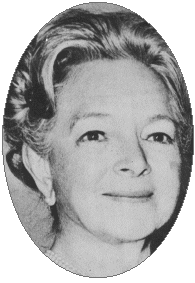 HELEN HAYES (1900-1993), American actress. Called the First Lady of the American Theater, she starred in such plays as "Dear Brutus" (1918), "Victoria Regina" (1936), and "A Touch of the Poet" (1958) and such films as "The Sin of Madelon Claudet" (1932 Academy Award; 1932 Venice Film Festival, Coppa Volpi for Best Actress) and "Airport" (1969; Academy Award). HELEN HAYES (1900-1993), American actress. Called the First Lady of the American Theater, she starred in such plays as "Dear Brutus" (1918), "Victoria Regina" (1936), and "A Touch of the Poet" (1958) and such films as "The Sin of Madelon Claudet" (1932 Academy Award; 1932 Venice Film Festival, Coppa Volpi for Best Actress) and "Airport" (1969; Academy Award).  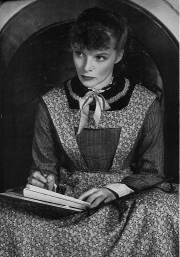 KATHARINE HEPBURN (1907-2003), American actress of film, stage, and television. Known for her headstrong independence and spirited personality, Hepburn's career as a Hollywood leading lady spanned more than 60 years, the only actor/actress to be nominated for twelve Academy Awards and the only woman to win four as Best Actress--three of them after the age of sixty. Her debut opposite John Barrymore in "A Bill of Divorcement" was an instant success. Her third movie, "Morning Glory" (1933), earned her an Oscar and her fourth, "Little Women KATHARINE HEPBURN (1907-2003), American actress of film, stage, and television. Known for her headstrong independence and spirited personality, Hepburn's career as a Hollywood leading lady spanned more than 60 years, the only actor/actress to be nominated for twelve Academy Awards and the only woman to win four as Best Actress--three of them after the age of sixty. Her debut opposite John Barrymore in "A Bill of Divorcement" was an instant success. Her third movie, "Morning Glory" (1933), earned her an Oscar and her fourth, "Little Women Tracy & Hepburn the Definitive Collection The Philadelphia Story (Two-Disc Special Edition) Posters
Books
 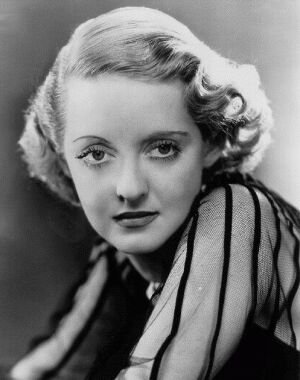 BETTE DAVIS (1908 - 1989) American actress born in Lowell, Massachusetts, debuted in New York in 1929. In 1930 Universal Pictures signed her to a contract and Bette and her mother went to Hollywood. Her first film was "Bad sister" (1931), which also featured Humphrey Bogart, but her first big success came with George Arliss in "The man who played God" (1932). In 1934 when she was lent to RKO to play opposite Leslie Howard in OF HUMAN BONDAGE, and on account of her good reviews, she began to get better parts. The following year, she made DANGEROUS (1935), for which she won a Best Actress Oscar, the first of ten times she would be nominated. In 1936 Bette challenged the studio system and went to London to make pictures with a British company. After Warner Bros. successfully sued her, she returned to Hollywood and signed a new contract offering her even better roles. In 1937 the Venice Film Festivl awarded her the Coppa Volpi for Best actress in "Kid Galahad" by Michael Curtiz and "Marked Woman" by Lloyd Bacon. She won the second of her two Best Actress awards for William Wyler's JEZEBEL in 1938 (also starring Henry Fonda), and made four notable films in 1939 including DARK VICTORY with Humphrey Bogart, JUAREZ, THE OLD MAID and THE PRIVATE LIVES OF ELIZABETH AND ESSEX.
Bette Davis became famous and often imitated for her clipped diction and distinct mannerisms (especially her extravagent cigarette smoking), and her popularity continued to grow with successes such as ALL THIS, AND HEAVEN TOO (1940), THE LETTER (1940) with Herbert Marshall, THE LITTLE FOXES (1941) with Teresa Wright, and NOW, VOYAGER (1942) with Paul Henried. Her career faltered in the late forties, but she came roaring back in 1950 playing the fading Broadway star Margo Channing in ALL ABOUT EVE, the Best Picture of the year. In WHAT EVER HAPPENED TO BABY JANE? (1962) was also starring Joan Crawford. Bette continued to adapt to new acting opportunities throughout her career, taking on roles in horror films in later years as well as making various TV appearances. Her personal life was not as successful however, having been married four times and suffering estrangement from her daughter. Her last significant film appearance was THE WHALES OF AUGUST in 1987. In 1977, she was the first woman to receive the American Film Institute Life Achievement Award, and she died in 1989 in Neuilly-sur-Seine, France. BETTE DAVIS (1908 - 1989) American actress born in Lowell, Massachusetts, debuted in New York in 1929. In 1930 Universal Pictures signed her to a contract and Bette and her mother went to Hollywood. Her first film was "Bad sister" (1931), which also featured Humphrey Bogart, but her first big success came with George Arliss in "The man who played God" (1932). In 1934 when she was lent to RKO to play opposite Leslie Howard in OF HUMAN BONDAGE, and on account of her good reviews, she began to get better parts. The following year, she made DANGEROUS (1935), for which she won a Best Actress Oscar, the first of ten times she would be nominated. In 1936 Bette challenged the studio system and went to London to make pictures with a British company. After Warner Bros. successfully sued her, she returned to Hollywood and signed a new contract offering her even better roles. In 1937 the Venice Film Festivl awarded her the Coppa Volpi for Best actress in "Kid Galahad" by Michael Curtiz and "Marked Woman" by Lloyd Bacon. She won the second of her two Best Actress awards for William Wyler's JEZEBEL in 1938 (also starring Henry Fonda), and made four notable films in 1939 including DARK VICTORY with Humphrey Bogart, JUAREZ, THE OLD MAID and THE PRIVATE LIVES OF ELIZABETH AND ESSEX.
Bette Davis became famous and often imitated for her clipped diction and distinct mannerisms (especially her extravagent cigarette smoking), and her popularity continued to grow with successes such as ALL THIS, AND HEAVEN TOO (1940), THE LETTER (1940) with Herbert Marshall, THE LITTLE FOXES (1941) with Teresa Wright, and NOW, VOYAGER (1942) with Paul Henried. Her career faltered in the late forties, but she came roaring back in 1950 playing the fading Broadway star Margo Channing in ALL ABOUT EVE, the Best Picture of the year. In WHAT EVER HAPPENED TO BABY JANE? (1962) was also starring Joan Crawford. Bette continued to adapt to new acting opportunities throughout her career, taking on roles in horror films in later years as well as making various TV appearances. Her personal life was not as successful however, having been married four times and suffering estrangement from her daughter. Her last significant film appearance was THE WHALES OF AUGUST in 1987. In 1977, she was the first woman to receive the American Film Institute Life Achievement Award, and she died in 1989 in Neuilly-sur-Seine, France.

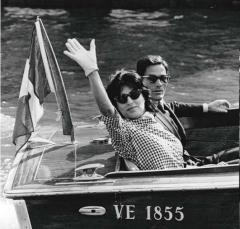 ANNA MAGNANI (1908 - 1973) Italian stage and film actress, winner of the Academy Award for Best Actress, along with four other international awards, for her portrayal of a Sicilian widow in The Rose Tattoo (La Rosa Tatuata); awarded wth the Coppa Volpi for Best Actress in 1947 by ther Venice Film Festival for "L'Onorevole Angelina".
Born in Rome, Magnani worked her way through Rome's Academy of Dramatic Art by singing at night clubs. She was referred to as "La Lupa," after one of her astonishing performance in a play based on a novel by Giovanni Verga. Time magazine described her personality as "fiery", and drama critic Harold Clurman said her acting was "volcanic". In the realm of Italian cinema, she was "passionate, fearless, and exciting," an actress that film historian Barry Monush calls "the volcanic earth mother of all Italian cinema." As early as 1950, Life magazine had already stated that Magnani was "one of the most impressive actresses since Garbo"; director Roberto Rossellini instead used to call her "the greatest acting genius since Eleonora Duse". Playwright Tennessee Williams became an admirer of her acting and wrote The Rose Tattoo specifically for her to star in, a role for which she received her first Oscar in 1955.
After meeting director Goffredo Alessandrini she received her first screen role in "La cieca di Sorrento" (The Blind Woman of Sorrento) (1934) and later achieved international fame in Roberto Rossellini's "Roma Città aperta" (Rome, Open City - 1945), considered the first significant movie to launch the Italian neorealism movement in cinema. ANNA MAGNANI (1908 - 1973) Italian stage and film actress, winner of the Academy Award for Best Actress, along with four other international awards, for her portrayal of a Sicilian widow in The Rose Tattoo (La Rosa Tatuata); awarded wth the Coppa Volpi for Best Actress in 1947 by ther Venice Film Festival for "L'Onorevole Angelina".
Born in Rome, Magnani worked her way through Rome's Academy of Dramatic Art by singing at night clubs. She was referred to as "La Lupa," after one of her astonishing performance in a play based on a novel by Giovanni Verga. Time magazine described her personality as "fiery", and drama critic Harold Clurman said her acting was "volcanic". In the realm of Italian cinema, she was "passionate, fearless, and exciting," an actress that film historian Barry Monush calls "the volcanic earth mother of all Italian cinema." As early as 1950, Life magazine had already stated that Magnani was "one of the most impressive actresses since Garbo"; director Roberto Rossellini instead used to call her "the greatest acting genius since Eleonora Duse". Playwright Tennessee Williams became an admirer of her acting and wrote The Rose Tattoo specifically for her to star in, a role for which she received her first Oscar in 1955.
After meeting director Goffredo Alessandrini she received her first screen role in "La cieca di Sorrento" (The Blind Woman of Sorrento) (1934) and later achieved international fame in Roberto Rossellini's "Roma Città aperta" (Rome, Open City - 1945), considered the first significant movie to launch the Italian neorealism movement in cinema.SUGGESTED MOVIES starring ANNA MAGNANI: The Miracle (1948), Bellissima (1951), The Rose Tattoo (1955), The Fugitive Kind (1960), with Marlon Brando and directed by Sidney Lumet; Mamma Roma (1962). 
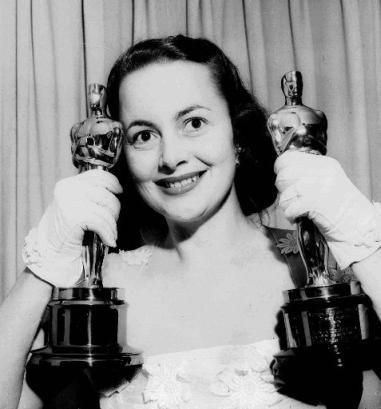 OLIVIA DE HAVILLAND (1916) British American film and stage actress born in Tokyo, winner of the Academy Award for Best Actress in 1946 and 1949. Wordly known for co-starring with Vivien Leigh in "Gone with the Wind".
As her first stage productionDe Havilland appeared as Hermia in A Midsummer Night's Dream, at the Hollywood Bowl.
Later she played opposite Errol Flynn in eight films. Allegedly, Joan Fontaine, de Havilland's sister, was approached by George Cukor to audition for "Gone with the Wind" (1939). When Fontaine learned he wanted her for the part of Melanie and not Scarlett, she reportedly turned him down by saying, âWhy donât you ask my sister!â Olivia de Havilland went on to play Melanie Hamilton Wilkes in Gone with the Wind and was nominated for an Academy Award for Best Supporting Actress for her performance.
In 1941, de Havilland became a naturalized citizen of the United States.
De Havilland was becoming increasingly frustrated by the roles assigned to her, and began to reject scripts. When her Warner Bros. contract expired, the studio informed her that six months had been added to it for times she had been on suspension; the law then allowed for studios to suspend contract players for rejecting a role and the period of suspension to be added to the contract period. De Havilland mounted a lawsuit in the 1940s, supported by the Screen Actors Guild and was successful, thereby reducing the power of the studios and extending greater creative freedom to the performers. The California Court of Appeal's decision and the statute on which it is based is still known as the De Havilland Law. Her victory won her the respect and admiration of her peers. The studio, however, vowed never to hire her again.
De Havilland signed a three picture deal with Paramount Pictures. She won Best Actress Academy Awards for To Each His Own (1946) and The Heiress (1949), and was Academy Awardânominated performance in "The Snake Pit" (1948) about state mental hospitals: de Havilland was lauded for her willingness to play a role that was completely devoid of glamor and that confronted such controversial subject matter. She won the New York Film Critics Award for both The Snake Pit and The Heiress. For The Snake Pit she also won the Coppa Volpi for Best actress at the Venice Film Festival in 1949.
De Havilland appeared sporadically in films after the 1950s.
In 1965, she was the first woman to preside over a Cannes jury. De Havilland continued acting on film until the late 1970s, afterward continuing her career on television until the late 1980s, highlighted by her winning a Golden Globe and earning a Emmy Award nomination for her performance as the Dowager Empress Maria in the 1986 miniseries Anastasia: The Mystery of Anna.
De Havilland and Errol Flynn were known as one of Hollywood's most exciting on-screen couples, but contrary to rumours, were never linked romantically. The eight films in which they co-starred are: "Captain Blood" (1935), "The Charge of the Light Brigade" (1936), "The Adventures of Robin Hood" and "Four's a Crowd" (1938), "Dodge City" and "The Private Lives of Elizabeth and Essex" (1939), "Santa Fe Trail" (1940) and "They Died with Their Boots On" (1941).
De Havilland was good friends with TBette Davis with whom she starred in "HushâĶ Hush, Sweet Charlotte" (1964), "The Private Lives of Elizabeth and Essex" (1939), "It's Love I'm After" (1937), and "In This Our Life" (1942). In 2008, she was a surprise guest at the Centennial Tribute to Bette Davis.
In 2004, Turner Classic Movies put together a retrospective piece called Melanie Remembers in which de Havilland was interviewed for the 65th anniversary of Gone with the Wind's original release. The film's last surviving principal cast member, de Havilland remembered every detail of her casting as well as filming. The 40-minute documentary can be seen on the Gone with the Wind four-disc special collector's edition.
At the age of 92, Olivia de Havilland received the United States National Medal of Arts, and at the age of 94, Chevalier of the LÃĐgion d'honneur, a decoration awarded by the President of the French Republic. OLIVIA DE HAVILLAND (1916) British American film and stage actress born in Tokyo, winner of the Academy Award for Best Actress in 1946 and 1949. Wordly known for co-starring with Vivien Leigh in "Gone with the Wind".
As her first stage productionDe Havilland appeared as Hermia in A Midsummer Night's Dream, at the Hollywood Bowl.
Later she played opposite Errol Flynn in eight films. Allegedly, Joan Fontaine, de Havilland's sister, was approached by George Cukor to audition for "Gone with the Wind" (1939). When Fontaine learned he wanted her for the part of Melanie and not Scarlett, she reportedly turned him down by saying, âWhy donât you ask my sister!â Olivia de Havilland went on to play Melanie Hamilton Wilkes in Gone with the Wind and was nominated for an Academy Award for Best Supporting Actress for her performance.
In 1941, de Havilland became a naturalized citizen of the United States.
De Havilland was becoming increasingly frustrated by the roles assigned to her, and began to reject scripts. When her Warner Bros. contract expired, the studio informed her that six months had been added to it for times she had been on suspension; the law then allowed for studios to suspend contract players for rejecting a role and the period of suspension to be added to the contract period. De Havilland mounted a lawsuit in the 1940s, supported by the Screen Actors Guild and was successful, thereby reducing the power of the studios and extending greater creative freedom to the performers. The California Court of Appeal's decision and the statute on which it is based is still known as the De Havilland Law. Her victory won her the respect and admiration of her peers. The studio, however, vowed never to hire her again.
De Havilland signed a three picture deal with Paramount Pictures. She won Best Actress Academy Awards for To Each His Own (1946) and The Heiress (1949), and was Academy Awardânominated performance in "The Snake Pit" (1948) about state mental hospitals: de Havilland was lauded for her willingness to play a role that was completely devoid of glamor and that confronted such controversial subject matter. She won the New York Film Critics Award for both The Snake Pit and The Heiress. For The Snake Pit she also won the Coppa Volpi for Best actress at the Venice Film Festival in 1949.
De Havilland appeared sporadically in films after the 1950s.
In 1965, she was the first woman to preside over a Cannes jury. De Havilland continued acting on film until the late 1970s, afterward continuing her career on television until the late 1980s, highlighted by her winning a Golden Globe and earning a Emmy Award nomination for her performance as the Dowager Empress Maria in the 1986 miniseries Anastasia: The Mystery of Anna.
De Havilland and Errol Flynn were known as one of Hollywood's most exciting on-screen couples, but contrary to rumours, were never linked romantically. The eight films in which they co-starred are: "Captain Blood" (1935), "The Charge of the Light Brigade" (1936), "The Adventures of Robin Hood" and "Four's a Crowd" (1938), "Dodge City" and "The Private Lives of Elizabeth and Essex" (1939), "Santa Fe Trail" (1940) and "They Died with Their Boots On" (1941).
De Havilland was good friends with TBette Davis with whom she starred in "HushâĶ Hush, Sweet Charlotte" (1964), "The Private Lives of Elizabeth and Essex" (1939), "It's Love I'm After" (1937), and "In This Our Life" (1942). In 2008, she was a surprise guest at the Centennial Tribute to Bette Davis.
In 2004, Turner Classic Movies put together a retrospective piece called Melanie Remembers in which de Havilland was interviewed for the 65th anniversary of Gone with the Wind's original release. The film's last surviving principal cast member, de Havilland remembered every detail of her casting as well as filming. The 40-minute documentary can be seen on the Gone with the Wind four-disc special collector's edition.
At the age of 92, Olivia de Havilland received the United States National Medal of Arts, and at the age of 94, Chevalier of the LÃĐgion d'honneur, a decoration awarded by the President of the French Republic.

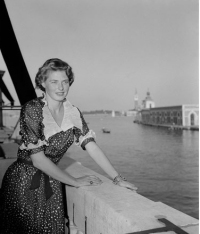 INGRID BERGMAN (1915 - 1982) Swedish actress, winner of three Academy Awards, two Emmy Awards, and the Tony Award for Best Actress. She is ranked as the fourth greatest female star of American cinema of all time by the American Film Institute. She is best remembered for her roles as Ilsa Lund in "Casablanca" (1942), a World War II drama co-starring Humphrey Bogart and as Alicia Huberman in "Notorious" (1946), an Alfred Hitchcock thriller co-starring Cary Grant.
One of Hollywood's greatest leading actresses. The Venice Film Festival awarded Ingrid Bergman posthumously in 1992 for a movie made 40 years earlier. Bergman's son, Roberto Rossellini, will accept the Volpi Cup for his mother's performance in a film called The Greatest Love in America and Europa 51 in Europe. Judges said Bergman was denied the award at the time because her voice was dubbed from Swedish into Italian.
Among her starring roles: "Casablanca", "For Whom the Bell Tolls" (1943), "Gaslight" (1944), "The Bells of St. Mary's" (1945), Alfred Hitchcock's "Spellbound" (1945), "Notorious" (1946), "Under Capricorn" (1949), and the independent production, "Joan of Arc" (1948).
In 1950, after a decade of stardom in American films, she starred in the Italian film Stromboli, which led to a love affair with director Roberto Rossellini while they were both already married. The affair and then marriage with Rossellini created a scandal that forced her to remain in Europe until 1956, when she made a successful Hollywood return in Anastasia, for which she won her second Academy Award. INGRID BERGMAN (1915 - 1982) Swedish actress, winner of three Academy Awards, two Emmy Awards, and the Tony Award for Best Actress. She is ranked as the fourth greatest female star of American cinema of all time by the American Film Institute. She is best remembered for her roles as Ilsa Lund in "Casablanca" (1942), a World War II drama co-starring Humphrey Bogart and as Alicia Huberman in "Notorious" (1946), an Alfred Hitchcock thriller co-starring Cary Grant.
One of Hollywood's greatest leading actresses. The Venice Film Festival awarded Ingrid Bergman posthumously in 1992 for a movie made 40 years earlier. Bergman's son, Roberto Rossellini, will accept the Volpi Cup for his mother's performance in a film called The Greatest Love in America and Europa 51 in Europe. Judges said Bergman was denied the award at the time because her voice was dubbed from Swedish into Italian.
Among her starring roles: "Casablanca", "For Whom the Bell Tolls" (1943), "Gaslight" (1944), "The Bells of St. Mary's" (1945), Alfred Hitchcock's "Spellbound" (1945), "Notorious" (1946), "Under Capricorn" (1949), and the independent production, "Joan of Arc" (1948).
In 1950, after a decade of stardom in American films, she starred in the Italian film Stromboli, which led to a love affair with director Roberto Rossellini while they were both already married. The affair and then marriage with Rossellini created a scandal that forced her to remain in Europe until 1956, when she made a successful Hollywood return in Anastasia, for which she won her second Academy Award.

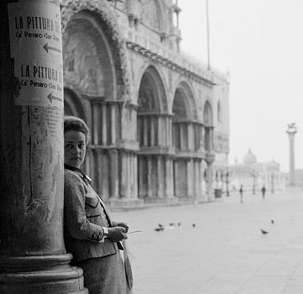 JEANNE MOREAU JEANNE MOREAU

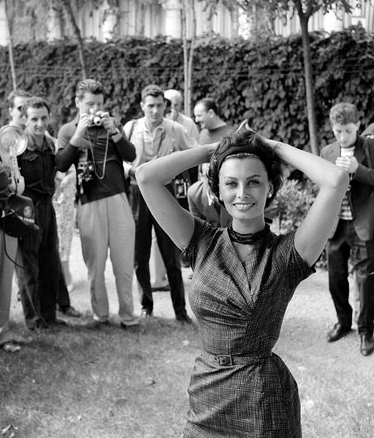 SOFIA LOREN SOFIA LOREN
 |
1932
1933
1935
1936
1937
1938
1939
1940
1941
1942
1946
1947
1948
1949
1950
1951
1952
1953
1954
1955
1956
1957
1958
1959
1960
1961
1962
1963
1964
1965
1966
1967
1968
1969 - 1979In these years the awards were abolished1980
1981
1982
1983
1984
1985
1986
1987
1988
1989
1990
1991
1992
1993
1994
1995
1996
1997
1998
1999
2000
2001
2002
2003
2004
2005
2006
2007
2008
2009
2010
2011
2012

|
Webdesign and Copyright Đ VeniceDream srl 2000-2020





